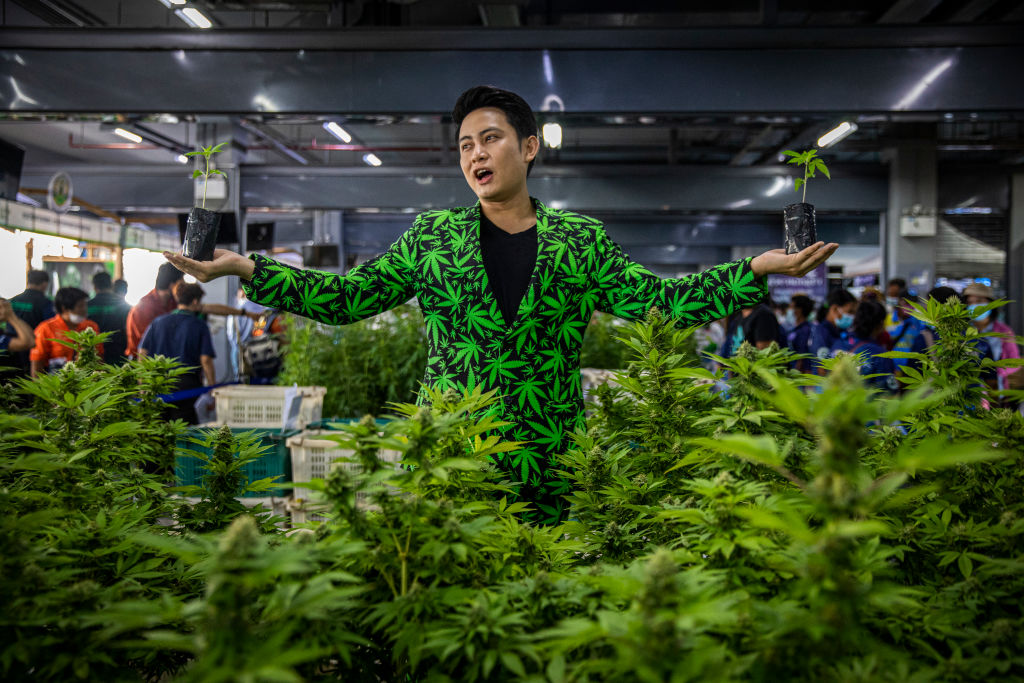
Southeast Asia, a region of 11 countries and some 680 million people, has long been infamous for having the strictest anti-drug laws in the world. But in a sign that regional leaders are mulling a new approach, Thailand became the first country in Asia last week to decriminalize marijuana for medical and other purposes. Smoking weed for fun is still illegal, Thai’s health minister clarified to CNN, but he expects legal cannabis production to boost the economy. Over 3,000 inmates incarcerated in Thai prisons for marijuana-related offenses were also freed.
This, coupled with changes to Thailand’s Narcotics Code last December to include alternatives to imprisonment for drug offenders, are signs that the country is slowly abandoning its strict drug policies, says Gloria Lai, regional director of the International Drug Policy Consortium. Lai tells TIME that Thailand’s government has recognized the problem of locking up so many people, most of them poor, for low-level offenses.
Thailand has the largest prison population among ASEAN countries—some 285,000 people—and more than 80% of inmates are there on drug-related charges. There are major issues of overcrowding at Thai prisons.
The business of legalizing marijuana
Economic benefits are also propelling Thailand’s reforms. The country has a climate conducive to growing cannabis and an established medical tourism industry. Martin Jelsma, director of the Drugs & Democracy project at the Transnational Institute (TNI) in Amsterdam, says the legalization will likely end the illegal trafficking of marijuana into Thailand, particularly from Laos.
“The hope is that Thai farmers and local companies will be able to benefit from the rapidly booming international medical cannabis market, but it will be a huge challenge to compete with established Canadian, U.S., and European companies who have already captured a large part of that global market,” he says.
Read more: Here’s What Science Says About Medical Marijuana
Global sales for medical cannabis were estimated at $37.4 billion in 2021, according to market intelligence firm Prohibition Partners’ Global Cannabis Report. The report says the market could be worth over $120 billion by 2026.
Whether or not other ASEAN countries will follow suit with Thailand remains to be seen, but Lai points out the emerging debates to decriminalize marijuana and other narcotics in Myanmar and Malaysia as a positive development.
A history of Asia’s war on drugs
ASEAN governments have tried to rein in the consumption and sale of drugs since the 1970s, but mainly through extreme punitive measures—despite studies providing evidence against its effectiveness. For instance, drug offenders have been sentenced to death in Singapore, Indonesia, and Malaysia, including for the trafficking of cannabis.
In 2003, the Thai government under Prime Minister Thaksin Shinawatra declared a war on drugs that was anchored on demonizing offenders. His campaign was popular, but saw more than 2,200 dead in the first three months, according to Human Rights Watch. It also became prone to abuse, as police conducted arbitrary arrests and intimidated human rights defenders.
The Philippines’ authoritarian leader Rodrigo Duterte has waged a similar bloody campaign in his country since 2016. Official data shows that some 6,200 were killed since then, though rights groups have pegged the figure at 13,000. Children were among the victims. Duterte’s approach has become so controversial that the International Criminal Court launched an investigation last year into alleged state crimes during the anti-narcotics drive.
Like in Thailand, the police engaged in the Philippines’ war on drugs have received U.S. equipment and training. And during the height of the Philippines’ war on drugs, then-U.S. President Donald Trump told Duterte to “keep up the good work—you’re doing an amazing job.”
Yet experts say that these approaches have not been able to stop or slow the region’s drug supply, with some markets even flourishing. “There’s been so much money, so much resources, and time that have been sunk into these responses that are so heavily brutally punitive, and they have caused so much harm to people and to communities, when they could have been investing all that into something that is proven by evidence to work instead,” Lai says.
Read more: Inside Philippine President Rodrigo Duterte’s War on Drugs
What happens next?
Taking a more laissez-faire approach to drugs would not be unprecedented in Southeast Asia. Much of the region’s harsh drug policies were drawn from the colonial era, only to be tightened further from the 1970s onwards as part of an American-style war on drugs.
Given this history, Thailand’s decision to decriminalize marijuana will intensify debates on the region’s drug policy, and resistance from some narcotics hardliners in ASEAN. Singapore has long defended the “drug-free ASEAN” dream—first announced in 1998 as a goal to be reached by 2015—and has actively lobbied the U.N. against legalizing cannabis in various parts of the globe.
Yet marijuana is only one part of Southeast Asia’s drug policy. Most of Thailand’s inmates on drug-related charges are methamphetamine-related offenses, and there are few signs of a softened approach against harder drugs.
A recent U.N. report said a record-breaking 171.5 tons of methamphetamine—including over a billion in pill form—were seized in East and Southeast Asia last year. This is seven times more than seizures made 10 years ago, with around three-quarters of the seizures in the five Southeast Asian countries traversed by the Mekong River: Cambodia, Laos, Myanmar, Thailand, and Vietnam.
With this, Jelsma of the TNI believes a common Southeast Asian approach to regulating marijuana and other narcotics is unlikely to happen. But he believes that in a region “so plagued by excessively repressive drug policies, the positive influence of Thailand’s recent policy changes on the regional debate is most welcome.”
More Must-Reads from TIME
- Cybersecurity Experts Are Sounding the Alarm on DOGE
- Meet the 2025 Women of the Year
- The Harsh Truth About Disability Inclusion
- Why Do More Young Adults Have Cancer?
- Colman Domingo Leads With Radical Love
- How to Get Better at Doing Things Alone
- Michelle Zauner Stares Down the Darkness
Contact us at letters@time.com